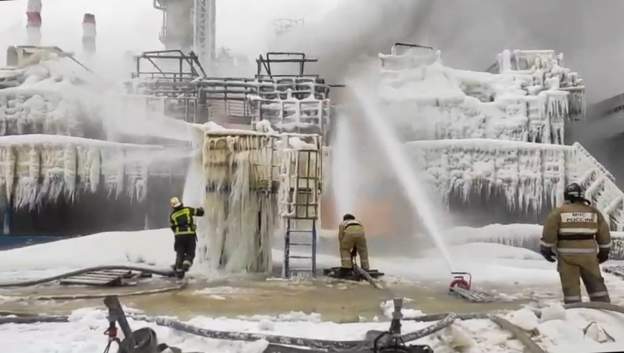Attack on Russia's Baltic Sea oil terminals threatens to cut up to 1.5 million barrels per day of exports - Bloomberg
The market reacted to the drone strike on Ust-Luga: on Monday, the price of Brent rose by more than 1%

Drone strikes in the Leningrad region threaten the facilities that help Russia receive a significant portion of its petrodollars. A successful attack on oil terminals in the Baltic Sea could halt the export of 1.5 million barrels per day, Bloomberg reports.
On Sunday, drones attacked Ust-Luga, Russia's largest port on the Baltic Sea, about 1,000 kilometers from the Ukrainian border. Two explosions set fire to a Novatek terminal that handles gas condensate. The terminal, which is involved in supplying fuel to the Russian army, was shut down, a source told Bloomberg.
The Leningrad region also has two large oil export terminals: one in Ust-Luga and the other in Primorsk, on the opposite shore of the Gulf of Finland. In Ust-Luga, right next to the Novatek terminal, there are berths for loading oil onto tankers, and then storage facilities for oil and oil products.
According to Kpler, more than 75% of Urals crude oil is exported from Ust-Luga and Primorsk. In total, tankers exported more than 40% of the crude oil (1.5 million barrels) that Russia exported by sea between January and November 2023, Bloomberg calculated.
The price of Urals fell below $60 per barrel in December, the International Energy Agency wrote last week. At this price, the cost of oil exported from Baltic ports amounted to about $90 million per day.
"Regular attacks or strikes by heavy drones could disrupt the work of the Baltic ports and lead to a reduction in exports," experts say.
Meanwhile, unknown drones carried out two more attacks in the Leningrad region last week: on Thursday and Friday, explosions occurred at Rosneft oil depots.
Russia has virtually no alternative ways to export such volumes of oil abroad. Urals is exported from western ports, but Novorossiysk could only accept an additional 300,000 barrels per day. In addition, Novorossiysk is much closer to Ukraine, which can attack it not only with air but also with sea drones.
Export terminals on the Barents Sea have limited capacity, and oil can only be delivered to them by rail, while transportation routes to China and the Far East are completely clogged, making it impossible to ship additional oil by them.
The market reacted to the drone strike on Ust-Luga: on Monday, the price of Brent rose by more than 1%. This shows that market participants are concerned about possible supply disruptions in the near future.
If you have read this article to the end, we hope that means it was useful for you.
We work to ensure that our journalistic and analytical work is of high quality, and we strive to perform it as competently as possible. This also requires financial independence. Support us for only UAH 196 per month.
Become a Mind subscriber for just USD 5 per month and support the development of independent business journalism!
You can unsubscribe at any time in your LIQPAY account or by sending us an email: [email protected]



